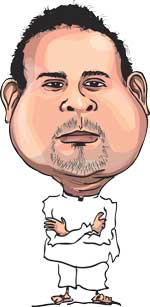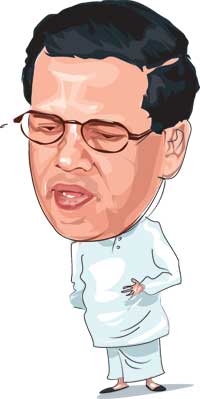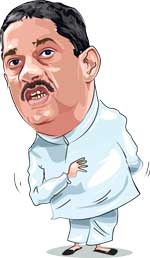Reply To:
Name - Reply Comment
Last Updated : 2024-04-20 16:40:00
.jpg) Minister of Public Management Reforms Navin Dissanayake, spoke to the Daily Mirror on his father’s legacy, the public administration system of the country and the weaknesses of the UNP.
Minister of Public Management Reforms Navin Dissanayake, spoke to the Daily Mirror on his father’s legacy, the public administration system of the country and the weaknesses of the UNP. It is a very difficult position, because the public service has been heading towards a single trajectory and we have to reorient it, make it less corrupt and more people-friendly. For this we have to retune and rewire the public servants. We are having a lot of training with regard to ethics, leadership skills and efficiency skills. I also feel that the structural organisation of these systems have to be reformed, to stop the duplication of services—the provincial councils and the central government duplicating activities. It is not something that can be done overnight, but I believe that in the next few years we can change the system, I already see a change in the younger lot—they are more professional in their approach and they perceive that merely receiving a remuneration is insufficient, but they too have to serve.
It is a very difficult position, because the public service has been heading towards a single trajectory and we have to reorient it, make it less corrupt and more people-friendly. For this we have to retune and rewire the public servants. We are having a lot of training with regard to ethics, leadership skills and efficiency skills. I also feel that the structural organisation of these systems have to be reformed, to stop the duplication of services—the provincial councils and the central government duplicating activities. It is not something that can be done overnight, but I believe that in the next few years we can change the system, I already see a change in the younger lot—they are more professional in their approach and they perceive that merely receiving a remuneration is insufficient, but they too have to serve..jpg) Q: How does this help to change the mentality and the attitude of those in the public service; if those employed in the public sector were merely employed to solve the issues of unemployment without considerating thier eligibility?
Q: How does this help to change the mentality and the attitude of those in the public service; if those employed in the public sector were merely employed to solve the issues of unemployment without considerating thier eligibility? Q: Health Minister Maithreepala Sirisena recently brought up the accusation that the current leader of the opposition Ranil Wickremesinghe leaked information to the SLFP of the time with regards to the details of your father’s campaign. What is your response to these accusations?
Q: Health Minister Maithreepala Sirisena recently brought up the accusation that the current leader of the opposition Ranil Wickremesinghe leaked information to the SLFP of the time with regards to the details of your father’s campaign. What is your response to these accusations? No, there was nothing like that. He had a couple of chats with Mr. Wickremesinghe. I remember very well that my father told him “I helped Premadasa despite having differences with him and I hope that you too will help me in the same way”.
No, there was nothing like that. He had a couple of chats with Mr. Wickremesinghe. I remember very well that my father told him “I helped Premadasa despite having differences with him and I hope that you too will help me in the same way”. Q: You crossed over from the UNP in 2007, looking back at the years that you have been in the SLFP/UPFA do you think you made the right decision? Have you been given due recognition? Are you happy with your portfolio?
Q: You crossed over from the UNP in 2007, looking back at the years that you have been in the SLFP/UPFA do you think you made the right decision? Have you been given due recognition? Are you happy with your portfolio? I still remember the day after the 2004 election, at the first parliamentary group meeting Sajith said that positions should be elected and I seconded that motion. Now they have a process of electing leaders and that is very good. Many people tell me that there is no opposition in this country. Journalists present us with more questions than the opposition. For instance let’s take the Malaka Silva issue, last week, was the parliamentary week. Was there any discussion of this matter and a critique by the opposition? No. As a government we wish to face a strong opposition.
I still remember the day after the 2004 election, at the first parliamentary group meeting Sajith said that positions should be elected and I seconded that motion. Now they have a process of electing leaders and that is very good. Many people tell me that there is no opposition in this country. Journalists present us with more questions than the opposition. For instance let’s take the Malaka Silva issue, last week, was the parliamentary week. Was there any discussion of this matter and a critique by the opposition? No. As a government we wish to face a strong opposition. Q: How do you view this recent incident with Mervyn Silva’s son and what followed with the court case?
Q: How do you view this recent incident with Mervyn Silva’s son and what followed with the court case?

Add comment
Comments will be edited (grammar, spelling and slang) and authorized at the discretion of Daily Mirror online. The website also has the right not to publish selected comments.
Reply To:
Name - Reply Comment
On March 26, a couple arriving from Thailand was arrested with 88 live animal
According to villagers from Naula-Moragolla out of 105 families 80 can afford
Is the situation in Sri Lanka so grim that locals harbour hope that they coul
A recent post on social media revealed that three purple-faced langurs near t